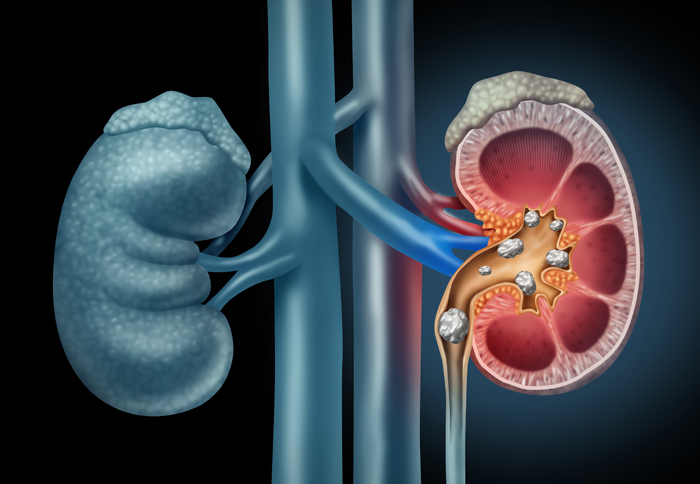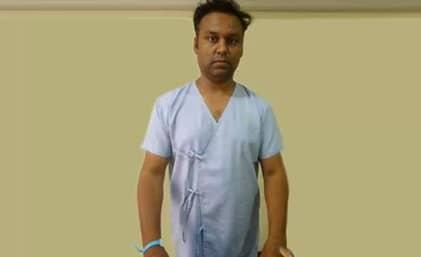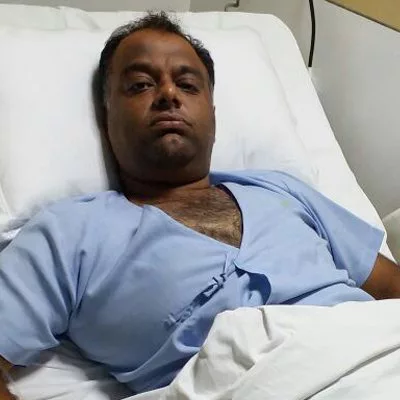Urology
Urology encompasses the evaluation, diagnosis, treatment, and prevention of diseases, which can damage the genitourinary organs and reproductive tract in men. Organs that fall under this are kidneys, adrenal glands, ureters, urethra, urinary bladder, and the male reproductive organs include the testes, prostate, penis, seminal vesicles, epididymis, and vas deferens.
Urology specifically plays a significant role in men’s health. Therefore, the doctors who specialize in the field of medicine are called urologists.

What are The Symptoms of Urology Disorders?
You may experience the below-mentioned symptoms if a disease or infection is affecting any of your urological organs:
- Urinary incontinence
- Difficulty in urinating
- Fluctuating frequency of urination
- Discomfort in the lower abdomen area
- Pelvic pain
- Lower back pain
- Chronic urinary tract infections
- Infertility
- Blood in urine
- Erectile dysfunction
- Pain in genitals
Seek the consultation of a urology specialist near you if you display any such signs.
Who Can Qualify for Urology Treatment?
Some conditions for which you should visit a urology hospital near you include:
- Kidney stones: Hard deposits of salts and minerals develop in your kidneys
- Blood in urine: Can occur from infection, urological cancer, or stones.
- Pain in the penis: Inability to retract the foreskin can result in pain during erection or urinating. Other causes can be a skin lesion that may mean penile cancer.
- Testicular pain or swelling: Reasons include dilated veins, testicular cancer, disruption in the blood supply to the testicles.
- Male infertility: Male infertility can be due to low sperm count, non-motile sperm, or absent sperm.
- Pain in the flanks: Urinary infections, kidney stones, or obstruction in urine outflow from your kidneys can cause this pain.
- Enlarged prostate: Enlargement of the prostate gland can weaken your urinary system.
- Sexual dysfunction: Inability to achieve or sustain an erection, premature ejaculation, pain during sexual intercourse are a few problems, for which a consultation with a urology doctor near you can prove beneficial.
- Urinary incontinence: Loss of bladder control
- Varicocele: Inflammation of the veins in the scrotum
When Should You See A Doctor?
You may consult your family doctor for minor urological issues. But, if your condition fails to improve, visiting a urology specialty hospital near you is highly advisable.
Here are a few indications that it is time to visit a urologist:
- Frequent or an excessive urge to urinate
- Dribbling or weak urine flow
- Persistent bleeding in your urine
- Pain or a burning sensation while urinating
- Problem obtaining or maintaining an erection
- Decreased sexual urge
- Severe constipation
- A lump or mass in the testicle
Request an appointment at Apollo Spectra Hospitals
Call 1860-500-2244 to book an appointment
How are Urological Conditions Diagnosed?
After understanding your symptoms, a urology specialist may run a few diagnostic tests such as:
- Blood tests
- Urine specimen collection
- Imaging tests:
- Antegrade pyelogram
- CT (computed tomography) scan
- Intravenous pyelogram
- Cystography
- Ultrasound of the kidney
- Renal angiogram
- Prostate/rectal sonogram
- Cystometry
- Urine flow tests
Schedule an appointment at the best urology hospital near you.
Which Surgical Procedures Come Under Urology?
Urology surgeons can proficiently perform different types of surgeries like:
- Cystectomy for removing the bladder to treat cancer
- Biopsies of the kidneys, prostate, or bladder
- Prostatectomy to treat prostate cancer by removing all or a portion of the prostate gland
- Extracorporeal shock-wave lithotripsy to break kidney stones and remove them.
- Kidney transplant to remove a damaged kidney and replace it with a healthy one
- Surgery to repair deformed urinary organs
- A sling procedure to treat urinary incontinence
- Ureteroscopy helps to remove stones in the kidneys and ureter
- Vasectomy, surgery for male sterilization
- Reverse vasectomy to restore fertility in men
- Transurethral resection of the prostate for removing the excess tissue from an enlarged prostate
Today, with robotic-assisted treatment techniques, you are assured of urological treatment that offers improved precision, smaller incisions, faster healing, and a shorter hospital stay.
Conclusion
Urologists decide the treatment plan based on your urological disorder and its severity. But a timely diagnosis plays a significant role in this and makes regular screenings vital. Visit a urology specialist if you notice any unusual symptoms and to know the appropriate treatment.
Urology experts recommend that you start yearly screenings from the age of 40. It includes a digital rectal examination and prostate-specific antigen (PSA) blood screening.
To promote good urological health, you can:
- Maintain a healthy weight.
- Stay hydrated.
- Strengthen your pelvic muscles with Kegel exercises.
- Limit your caffeine and salt intake.
- Quit smoking.
To treat kidney stones, today, urologists deploy methods like:
- High-powered laser technology
- Percutaneous nephrolithotomy (PCNL)
- Disposable single-use scopes (ureteroscopes)
Our Doctors
DR. M. R. PARI
MS, MCh (Uro)...
| Experience | : | 15 Years Experience |
|---|---|---|
| Speciality | : | Urology... | Location | : | MRC Nagar |
| Timings | : | On Call... |
DR. PRAVESH GUPTA
MBBS,MS,MCh...
| Experience | : | 5 Years Experience |
|---|---|---|
| Speciality | : | Urology... | Location | : | Vikas Nagar |
| Timings | : | Mon - Sat : 10:00 A... |
DR. ABHAS KUMAR
MBBS, DNB...
| Experience | : | 7 Years Experience |
|---|---|---|
| Speciality | : | Neurology and Neuro ... | Location | : | Vikas Nagar |
| Timings | : | Mon - Sat : 10:00 A... |
DR SUMIT BANSAL
MBBS, MS,MCH ...
| Experience | : | 7 Years Experience |
|---|---|---|
| Speciality | : | Urology... | Location | : | Sector 8 |
| Timings | : | Thur- 12:00 PM to 1:... |
DR. SHALABH AGRAWAL
MBBS,MS,DNB...
| Experience | : | 13 Years Experience |
|---|---|---|
| Speciality | : | Urology... | Location | : | Sector 8 |
| Timings | : | Mon, Wed & Fri - 11:... |
DR. VIKAS KATHURIA
MBBS,MS,M.CH...
| Experience | : | 19 Years Experience |
|---|---|---|
| Speciality | : | Neurology and Neuro ... | Location | : | Sector 8 |
| Timings | : | Mon & Wed : 3:30PM t... |
DR KUMAR ROHIT
MBBS,MS,Sr,Mch...
| Experience | : | 7 Years Experience |
|---|---|---|
| Speciality | : | Urology... | Location | : | Agam Kuan |
| Timings | : | Mon - Fri : 10:00 AM... |
DR ANIMESH UPADHYAY
MBBS, DNB...
| Experience | : | 8 Years Experience |
|---|---|---|
| Speciality | : | Neurology and Neuro ... | Location | : | Vikas Nagar |
| Timings | : | Mon to Sat : On Call... |
DR. ANUJ ARORA
MBBS, MS- GENERAL SU...
| Experience | : | 3 Years Experience |
|---|---|---|
| Speciality | : | Urology... | Location | : | NSG Chowk |
| Timings | : | Mon - Sat : 05:00 PM... |
DR. RANJAN MODI
MBBS, MD, DM...
| Experience | : | 8 Years Experience |
|---|---|---|
| Speciality | : | Cardiology/Urology &... | Location | : | Chirag Enclave |
| Timings | : | Mon - Sat : On Call... |
DR. A K JAYARAJ
MBBS, MS (Gen Surger...
| Experience | : | 10 Years Experience |
|---|---|---|
| Speciality | : | Urology... | Location | : | Alwarpet |
| Timings | : | Mon - Sat | 6:30pm... |
DR. SRIVATHSAN R
MBBS, MS(General), M...
| Experience | : | 11 Years Experience |
|---|---|---|
| Speciality | : | Urology... | Location | : | MRC Nagar |
| Timings | : | Mon - Sat | 5:00pm... |
DR. LAKSHMAN SALVE
MS (General Surgery)...
| Experience | : | 12 Years Experience |
|---|---|---|
| Speciality | : | Urology... | Location | : | Chembur |
| Timings | : | Mon to Sat: 1pm to ... |
DR. A K JAYARAJ
MBBS, MS(Gen Surgery...
| Experience | : | 10 Years Experience |
|---|---|---|
| Speciality | : | Urology... | Location | : | MRC Nagar |
| Timings | : | Available by prior a... |
DR. ANANDAN N
MBBS,MS, FRCS, DIP. ...
| Experience | : | 42 Years Experience |
|---|---|---|
| Speciality | : | Urology... | Location | : | MRC Nagar |
| Timings | : | Mon - Sat : 12:30 PM... |
DR. CHANDRANATH R TIWARI
MBBS., MS., M.Ch ( N...
| Experience | : | 8 Years Experience |
|---|---|---|
| Speciality | : | Neurology and Neuro ... | Location | : | Tardeo |
| Timings | : | Available by prior a... |
DR. PRAVIN GORE
MBBS, DNB (General S...
| Experience | : | 17 Years Experience |
|---|---|---|
| Speciality | : | Urology... | Location | : | Chembur |
| Timings | : | Sat : 12:00 PM to 2:... |
DR. PRIYANK SALECHA
MS, DNB...
| Experience | : | 4 Years Experience |
|---|---|---|
| Speciality | : | Urology... | Location | : | Kondapur |
| Timings | : | Mon - Sat : 11:00 AM... |
DR. VINEET SINGH SOMVANSHI
M.CH, Master of Surg...
| Experience | : | 10 Years Experience |
|---|---|---|
| Speciality | : | Urology... | Location | : | Chunni Ganj |
| Timings | : | Mon - Sat : 2:00 PM ... |
DR. DILIP DHANPAL
MBBS, MS, M.Ch...
| Experience | : | 37 Years Experience |
|---|---|---|
| Speciality | : | Urology... | Location | : | Koramangala |
| Timings | : | Mon - Sat : 9:30 AM ... |
DR. JATIN SONI
MBBS, DNB Urology...
| Experience | : | 9+ Years Experience |
|---|---|---|
| Speciality | : | Urology... | Location | : | MRC Nagar |
| Timings | : | Mon - Sat : 6:00 PM ... |
DR. R JAYAGANESH
MBBS, MS - General S...
| Experience | : | 35 Years Experience |
|---|---|---|
| Speciality | : | Urology... | Location | : | Alwarpet |
| Timings | : | Available by prior a... |
DR. SUPARN KHALADKAR
MBBS, DNB...
| Experience | : | 13 Years Experience |
|---|---|---|
| Speciality | : | Urology... | Location | : | Sadashiv Peth |
| Timings | : | Available on prior a... |
DR. ADITYA DESHPANDE
MBBS, MS (Urology)...
| Experience | : | 19 Years Experience |
|---|---|---|
| Speciality | : | Urology... | Location | : | Sadashiv Peth |
| Timings | : | Mon - Sat: 7:00 PM t... |
DR. MOHD HAMID SHAFIQUE
MBBS, MS(Gen. Surg.)...
| Experience | : | 16 Years Experience |
|---|---|---|
| Speciality | : | Urology... | Location | : | Tardeo |
| Timings | : | Tue, Thur, Sat : 7:0... |
DR. ABHISHEK SHAH
MBBS, MS (General Su...
| Experience | : | 15 Years Experience |
|---|---|---|
| Speciality | : | Urology... | Location | : | Chembur |
| Timings | : | Mon, Tue, Thur, Fri ... |
DR. RAMANUJAM S
MBBS, MS (General Su...
| Experience | : | 18 Years Experience |
|---|---|---|
| Speciality | : | Neurology and Neuro ... | Location | : | MRC Nagar |
| Timings | : | Mon - Sat : 1:30 PM ... |
DR. PAWAN RAHANGDALE
MBBS, MS (General Su...
| Experience | : | 15 Years Experience |
|---|---|---|
| Speciality | : | Urology... | Location | : | Sadashiv Peth |
| Timings | : | Mon - Thur: 4:00 PM ... |
DR. RAJEEV CHAUDHARI
MBBS, MS (General Su...
| Experience | : | 37 Years Experience |
|---|---|---|
| Speciality | : | Urology... | Location | : | Sadashiv Peth |
| Timings | : | Available by prior a... |
DR. VIKRAM SATAV
MBBS, MS (Gen Surger...
| Experience | : | 25 Years Experience |
|---|---|---|
| Speciality | : | Urology... | Location | : | Sadashiv Peth |
| Timings | : | Available by prior a... |
DR. NASREEN GITE
MBBS, MS (General Su...
| Experience | : | 17 Years Experience |
|---|---|---|
| Speciality | : | Urology... | Location | : | Chembur |
| Timings | : | Mon, Wed, Fri : 11:0... |
DR. RAJ AGARBATTIWALA
MBBS, MS (General Su...
| Experience | : | 22 Years Experience |
|---|---|---|
| Speciality | : | Neurology and Neuro ... | Location | : | Chembur |
| Timings | : | Mon - Sat : 5:00 PM ... |
DR. ZAFFER SYED
MBBS, DNB, MCh...
| Experience | : | 11 Years Experience |
|---|---|---|
| Speciality | : | Urology... | Location | : | Chembur |
| Timings | : | Mon, Wed, Fri : 6:00... |
DR. JITENDRA SAKHRANI
MBBS, MS (General Su...
| Experience | : | 10 Years Experience |
|---|---|---|
| Speciality | : | Urology... | Location | : | Tardeo |
| Timings | : | Mon, Thur : 6:00 PM ... |
DR.N. RAGAVAN
MBBS, MS, FRCSEd, MD...
| Experience | : | 30 Years Experience |
|---|---|---|
| Speciality | : | Urology... | Location | : | Alwarpet |
| Timings | : | Tue : 4:00 PM to 5:0... |
DR. RAVINDRA HODARKAR
MS, MCh (Uro), DNB (...
| Experience | : | 37 Years Experience |
|---|---|---|
| Speciality | : | Urology... | Location | : | Chembur |
| Timings | : | Mon - Fri : 8:00 PM ... |
DR. M.G.SHEKAR
MBBS, MS, MCh(Uro), ...
| Experience | : | 18+ Years Experience |
|---|---|---|
| Speciality | : | Urology... | Location | : | MRC Nagar |
| Timings | : | Available by prior a... |
DR. SUBRAMANIAN S
MBBS, MS (GEN SURG),...
| Experience | : | 51 Years Experience |
|---|---|---|
| Speciality | : | Urology... | Location | : | MRC Nagar |
| Timings | : | Mon - Sat : 5:00 PM ... |
DR. SREEDHAR REDDY
MBBS, MS (General Su...
| Experience | : | 33 Years Experience |
|---|---|---|
| Speciality | : | Urology... | Location | : | Koramangala |
| Timings | : | Mon - Sat : 4:00 PM... |
DR. ZUBAIR SARKAR
MBBS, MD, DM in NEUR...
| Experience | : | 8 Years Experience |
|---|---|---|
| Speciality | : | Neurology... | Location | : | Chunni Ganj |
| Timings | : | Mon - Sat : 10:00 AM... |
DR. S K PAL
MBBS,MS, M.Ch...
| Experience | : | 30 Years Experience |
|---|---|---|
| Speciality | : | Urology... | Location | : | Chirag Enclave |
| Timings | : | Tue, Thu: 1pm to 2pm... |
DR. TARUN JAIN
MBBS, MS (General Su...
| Experience | : | 13 Years Experience |
|---|---|---|
| Speciality | : | Urology... | Location | : | Tardeo |
| Timings | : | Available by prior a... |
DR. PRIYANK KOTHARI
MBBS, MS , Mch ( Uro...
| Experience | : | 11 Years Experience |
|---|---|---|
| Speciality | : | Urology... | Location | : | Tardeo |
| Timings | : | Available by prior a... |
DR. R. RAJU
MBBS, MS, MCh (Urolo...
| Experience | : | 12 Years Experience |
|---|---|---|
| Speciality | : | Urology... | Location | : | Koramangala |
| Timings | : | Tue, Thur, Sat : 10:... |
DR. SUNANDAN YADAV
MBBS, MS, MCh (Urolo...
| Experience | : | 6 Years Experience |
|---|---|---|
| Speciality | : | Urology... | Location | : | Lal kothi |
| Timings | : | Mon - Sat : 5:00 PM ... |
DR. ALOK DIXIT
MBBS, MS (General Su...
| Experience | : | 14 Years Experience |
|---|---|---|
| Speciality | : | Neurology and Neuro ... | Location | : | Vikas Nagar |
| Timings | : | Mon - Sat : 10:00 AM... |
DR. AMIT BANSAL
MBBS, MS (General Su...
| Experience | : | 13 Years Experience |
|---|---|---|
| Speciality | : | Urology... | Location | : | Karol Bagh |
| Timings | : | Mon, Wed, Thur : 9:0... |
DR. SHIV RAM MEENA
MBBS, MS (Gen Surger...
| Experience | : | 13 Years Experience |
|---|---|---|
| Speciality | : | Urology... | Location | : | Lal kothi |
| Timings | : | Mon - Sat : 9:00 AM ... |
DR. VIJAYANT GOVIND GUPTA
MBBS, MS, MCh...
| Experience | : | 12+ Years Experience |
|---|---|---|
| Speciality | : | Urology... | Location | : | Karol Bagh |
| Timings | : | Tue, Thur : 10:30 AM... |
DR. ANKIT GUPTA
MBBS, MS (General Su...
| Experience | : | 7 Years Experience |
|---|---|---|
| Speciality | : | Urology... | Location | : | Sector 82 |
| Timings | : | Thur : 4:40 PM to 6:... |
DR. REENA THUKRAL
MBBS, DNB (Internal ...
| Experience | : | 20 Years Experience |
|---|---|---|
| Speciality | : | Neurology... | Location | : | Sector 82 |
| Timings | : | Mon, Wed, Fri : 10:0... |
DR. ANSHUMAN AGARWAL
MBBS, MS (General Su...
| Experience | : | 29 Years Experience |
|---|---|---|
| Speciality | : | Urology... | Location | : | Chirag Enclave |
| Timings | : | Available by prior a... |
DR. SHARAT KUMAR GARG
MBBS, DNB (Neurosurg...
| Experience | : | 11 Years Experience |
|---|---|---|
| Speciality | : | Neurology and Neuro ... | Location | : | NSG Chowk |
| Timings | : | Mon, Wed, Sat : 10:0... |
DR. AMIT BANSAL
MBBS, MS (General Su...
| Experience | : | 13 Years Experience |
|---|---|---|
| Speciality | : | Urology... | Location | : | Chirag Enclave |
| Timings | : | Tue, Fri, Sat :10:0... |
Our Patient Speaks
My name is Aalahuddin and I was treated at the Apollo Spectra, Kailash Colony for the problem of kidney stone. I think I have never come across a doctor like Dr. R.L. Nayak in my life - he is extremely friendly and excellent at his job. He helped me understand the intricacies of the kidney problem that had me crippled for a long time....
Aalahuddin
Urology
Kidney Stone
My name is Abbaz Razai and I am from Afghanistan. I learned about Apollo Spectra Hospital from Ubaid Solehi. I underwent a left varicocelectomy treatment at Apollo under Doctor Ashish Sabharwal. The staff, including doctors and nurses at Apollo, are great. However, I would suggest the hospital improve their canteen service. More staff must be hired in the canteen to ensure an efficient service. In...
Abbaz Razai
Urology
Variocele
My mother was admitted to Apollo Spectra for a surgery under the care of Dr. Ashish Sabharwal. An excellent doctor that he is, the surgery went on smoothly. The front office team were very helpful and swift during the admission process. The staff members took excellent care of my mother. They provided timely service, which is definitely appreciated. Thanks to the housekeeping staff, the rooms, was...
Amenah Mohamoodsussein Al Khafaji
Urology
DJ Stenting
My name is Amit Kumar. I am from New Delhi. It was good to be treated with professionalism and care and I would say that the doctor and all the other employees at the Apollo Spectra made me feel that I was in safe hands. A big thank you to all of them. I would definitely recommend it to my friends and family members....
Amit Kumar
Urology
PCNL
I am Anad Mohammed Hamood and I come from the Sultanate of OMAN. I underwent a treatment for Left Varicocele at Apollo Spectra Hospital, Kailash colony, and was treated by Dr Vineet Malhotra. The Apollo Spectra is a great hospital with very helpful and compassionate staff. I am thoroughly satisfied with my experience here. Thank you...
Anad Mohammed
Urology
Variocele
My name is Bibhu Das and I was referred to Dr. Sreedhar Reddy by my friend. I had a Prostatectomy and Dr. Reddy was extremely helpful and understanding. I am extremely satisfied with the services. I have had a speedy recovery and experienced no complications. The staff is kind and helpful and the rooms are very clean. I would definitely recommend Apollo Spectra to all my friends and family members...
Bibhu Das
Urology
Prostectomy
My name is Chunnilal Bhat and I am from Jammu and Kashmir. I was experiencing complications with the proper functioning of my kidneys for the past one year. This is when I decided to undergo a treatment and consulted Dr Anshuman Aggarwal regarding the same. He referred me to the Apollo Spectra Hospital for the treatment of TURBT. Apollo Spectra provides utmost service and deserves a 10/10 rating. ...
Chunnilal Bhat
Urology
Cyst
I know Dr. R.L. Nayak for quite some time. I found some blood in my urine last week. I reported the same to Dr. Nayak. He called me here for an ultrasound on 7th Nov. 2017. The doctor who did my ultrasound was very nice and the staff behaviour was excellent. Dr. Nayak is so humble and friendly. Though the finding was scary, he made the disease so small by showing his confidence & comfort that we f...
Deepak
Urology
Transurethral Resection of Bladder
It is with great pleasure that I am giving this written note of appreciation for the excellent treatment that I received at the Apollo Spectra Hospital in New Delhi. With world class standards and excellent services, Apollo Spectra Hospital made my treatment and care very comfortable and effective. Dr Vineet, my surgeon, is not only an excellent surgeon, but is also professional and friendly. I ...
Dr. Denis Hagarty
Urology
Erectile Dysfunction
I am Dr. Santosh and I had my TURP surgery at the Apollo Spectra, Koramangala. I was operated by the experienced hands of Dr. Sreedhar Reddy. He was supportive and explained the process in detail to ease my fears. The nursing and the housekeeping staff worked very well to create a homely and comfortable environment for us. We would surely recommend the hospital to our friends and family members....
Dr. Santosh
Urology
TURP
When I got admitted to Apollo Spectra, initially I faced some glitches, such as unavailability of drinking water and extra bed for the attendant, and electric sockets were not working. However, post-complaint, everything was arranged according to my liking and the staff sorted out all the issues. It was commendable that everyone at the hospital was always ready to help. This was certainly a plus p...
Gaurav Gandhi
Urology
Circumcision
My name is Gopinath and I came to Apollo spectra hospital for my treatment. I found the overall service at Apollo great and I am thoroughly satisfied....
Gopinath
Urology
TURP
My name is Gurucharan Singh and I came to Apollo Spectra Hospital, Kailash colony for the treatment of my kidney infection and stone. We learned about Apollo Spectra through friends in other hospitals. They provided me the best service and attention I could have expected. The staff is very helpful and cooperative. I already have and will surely recommend this hospital to my family and friends in t...
Gurucharan Singh
Urology
Kidney Stone
My name is Meenu Vijjayan and I am from Gwalior. I came to know about Apollo Spectra Hospital from my relatives. I got operated for Nephrectomy (lap), Kidney removal, under Dr Anshuman Aggarwal. My operation was successful and I am extremely satisfied with the services offered by Apollo....
Meenu Vijjayan
Urology
Kidney Removal
During the course of my surgery and treatment at the Apollo Spectra Hospital, I discovered that all the staff including the nurses, doctors as well as the administrative staff at the Apollo Spectra Hospital was very caring and attentive to my needs. I am very thankful to the doctor who performed my surgery, Dr. Anshuman Agarwal, for successfully performing the surgery on me. I am feeling very ...
Mohammad Neem
Urology
Prostate Enlargement
Once I entered the Apollo Spectra Hospital, I was given a quality of treatment and care that made me feel like I was in very safe hands, under the guidance of some of the best doctors. I found all the staff at the hospital, including the nurses, front office and the support staff to be very nice, helpful and supportive. Dr. Anshuman Agarwal, who performed my surgery, is a very nice person, who tre...
Mostofi Rehman
Urology
Diagnostic Cystoscopy
I was suffering from lower abdominal pain when our family doctor referred me to Apollo Spectra, Karol Bagh. When I came here, I was diagnosed properly and told that I needed total laparoscopic histoscopy. I felt that I got the right treatment at the right time at Apollo Spectra, Karol Bagh under the care of Dr. Malvika Sabharwal and Dr. Shivani Sabharwal. The hospital was humble and caring and...
Mrs. Sudha Khandelwal
Urology
Uterus Removal
I came to Apollo Spectra Hospital Tardeo for my treatment, Dr Ketan Desai suggested cystoscopy. I’m very happy with the guidance & treatment given by the doctors & staff. Overall, I had a very pleasant and smooth experience at the Apollo Spectra Hospital and would like to thank everyone at the hospital who helped me overcome the fears I had....
Naseer Al Rahbi
Urology
Cyst
The ambience and the whole environment of the hospital is so good that you will feel like you are staying at a hotel of good reputation. They are one of the cleanest medical establishments that I have ever come across. The whole team was incredibly friendly and professional. Here, I was under the care of Dr. Rajiba Lochan Nayak. He is such a humble person. He was very kind and thoughtful. Also, th...
Neeraj Rawat
Urology
RIRS
My name is Nina, and I was suffering from kidney stones. I learned about Apollo Spectra Hospital through my relatives and came here for my kidney stone surgery. The staff at Apollo is friendly, well-behaved, and soft spoken. Given the wonderful treatment I received here, I would surely recommend Apollo Spectra care to my family and friends for their future treatments....
Nina
Urology
Kidney Stone
My name is Olvwatosin. I am 23 years old and got to know about the Apollo Spectra Hospital, Kailash Colony through a company namely MTM, in my home country, Nigeria. I came to India for Urethral Stricture treatment. Here, I was attended by Dr Vineet Malhotra. The doctor, as well as the staff here, is extremely friendly and helpful. The service provided by the hospital, in general, is outstanding. ...
Olvwatosin
Urology
Urethral Stricture
have never come across a hospital, which is so clean. They have maintained the hygiene quotient of the hospital impeccably. My overall experience was more than satisfactory, and my entire stay was great. The staff made sure that I could relax and helped me relieve all the tension. I would also like to thank the nursing department for their commendable care and kindness. Thank you all for such an a...
Sarita Gupta
Urology
Ossiculoplasty
This was my first experience here at the Apollo Spectra Hospital, and I am as satisfied with it as could be. My surgery was performed by Dr. Ashish Sabharwal, who I found to be a very nice doctor, and an even better person. I would like to express my appreciation for all the staff including the nursing staff and the staff at the front desk for all the help that they provided to me during this ti...
Sukhchain Singh
Urology
Kidney Stone
My name is Sunil Ahuja and I came to know about Apollo Spectra Hospital, Kailash colony through Dr Ashish Sabharwal. I came to Apollo Spectra for the treatment of kidney stones. The services provided were average. The doctors are really good, however, the nursing staff is average and need some improvement. However, I would still recommend this hospital to my family and friends....
Sunil Ahuja
Urology
Kidney Stone
We came to Apollo Spectra Hospital for my father's cystoscope procedure under Dr Hiralal Choudhary, which went very well. The procedure was successful because of the skills and efficiency of Dr Choudhary and his entire team. Right from the janitor, nurses to the administration/Tpa team, all are efficient and know their duties well. Sorry, we won't be able to take all the names, but we thank and ap...
Sushanta Mitra
Urology
TURP
I was admitted to the Apollo Spectra Hospital following investigations and tests conducted on me. I had Cyst Surgery performed on my left shoulder. This was the first time I have been admitted to any hospital. Before the arrival of my doctor in-charge, Dr. Atul Peter, the nurses and other support staff was tending to me and even though my doctor had not arrived yet, I felt safe and that I was in...
Umesh Kumar
Urology
Cyst
NOTICE BOARD
CONTACT US
CONTACT US
 Book Appointment
Book Appointment
























































.webp)




















.webp)





.svg)
.svg)
.svg)
.svg)








